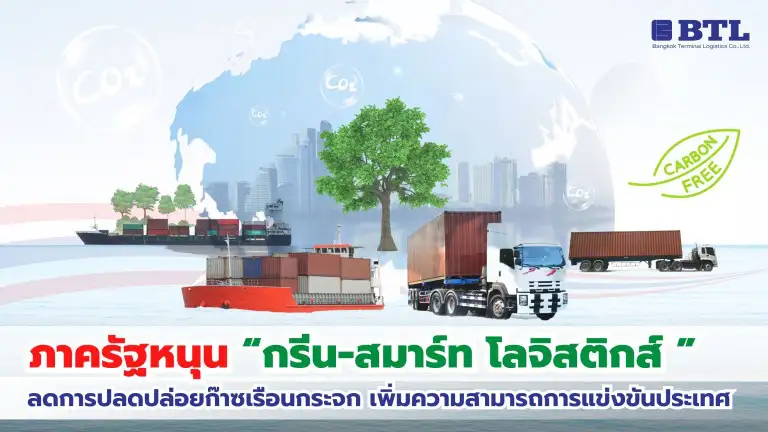Government Supports Green Smart Logistics to Reduce Greenhouse Gas Emissions and Enhance Competitiveness
November, 10 2023

The transport and logistics services industry is one of the future industries that will propel Thailand towards becoming a developed country, driven by innovation and technology.
Thailand has been ranked 34th out of 139 countries worldwide in the International Logistics Performance Index (LPI) by the World Bank, dropping from 32nd place in 2018. Within ASEAN, Thailand ranks third, behind Singapore and Malaysia.
Thailand's Strategy to Become a Regional Logistics Hub
According to Phusit Ratanakul Sereroengrit, Director-General of the Department of International Trade Promotion (DITP), Ministry of Commerce, the government has placed great emphasis on the logistics sector, aiming to position Thailand as the logistics hub of ASEAN.
This initiative aligns with Thailand’s 20-year National Strategy, particularly the third pillar, which focuses on enhancing national competitiveness. Logistics is also a key industry under the 13th National Economic and Social Development Plan, which prioritizes infrastructure development and seamless connectivity across regional, sub-regional, and border areas.
The Ministry of Commerce emphasizes enhancing the capabilities of logistics entrepreneurs to transition into the modern business era. The DITP has implemented various programs to improve efficiency, create best practices, and build strong networks between local and international logistics operators.
Digitalization: A New Challenge for Logistics
According to Suwit Rattanajinda, President of the Logistics Service Providers Federation, the rise of digital transformation and climate change presents new challenges for logistics businesses.
To address this, logistics operators must develop smart and green logistics solutions:
- Smart logistics: Implementing automated warehouse management systems and digital platforms for logistics operations. This includes electronic permit applications across 37 agencies, which both the public and private sectors must prepare for.
- Green logistics: Transitioning from carbon-intensive transportation to eco-friendly alternatives, such as replacing internal combustion engine (ICE) trucks with electric trucks (EVs), aligning with the global shift towards clean energy.
The TILOG-LOGISTIX 2023 event, held from August 17–19, 2023, at BITEC Hall 98, featured 415 brands from 25 countries showcasing logistics technology, innovation, and services. The event aimed to attract over 9,000 visitors and generate business negotiations worth over 4 billion THB.
According to Waraporn Thamcharit, Managing Director of RX Tradex, the event was themed “Smart and Green Logistics for a Sustainable Tomorrow”, highlighting technology-driven solutions for environmentally friendly logistics operations.
Key innovations on display included:
- AI-driven warehouse management systems
- Autonomous mobile picking robots
- Battery-powered forklifts
- Solar-powered intelligent warehouses
- Real-time security tracking systems
The Role of Logistics Providers in the Future of Trade
Kongrit Chantrik, Executive Director of the Thai National Shippers’ Council (TNSC), stated that logistics service providers (LSPs) must improve efficiency, invest in digital platforms, and adopt automation to enhance connectivity with customers.
Moreover, logistics businesses must align with global environmental regulations, such as the EU’s Carbon Border Adjustment Mechanism (CBAM), which imposes carbon pricing on imported goods. Other countries, including the United States, Japan, and China, are also expected to introduce similar policies.
To remain competitive, Thai exporters and logistics firms must collaborate strategically rather than merely outsourcing solutions. This includes:
- Developing strong total logistics solutions
- Building a robust logistics network to enable full supply chain traceability
- Providing alternative transport routes in case of disruptions
- Implementing digital trade facilitation platforms to enhance operational transparency and efficiency
Currently, Thailand's logistics costs account for 14% of GDP, compared to 10% or lower in developed nations. Reducing these costs is crucial for global competitiveness.
The Future of Thailand’s Logistics Industry
As global trade recovers post-COVID-19, Thailand’s logistics sector is expected to expand, driven by:
- E-commerce growth
- Infrastructure development
- Technological advancements in smart and green logistics
Moving forward, logistics businesses will no longer focus solely on financial gains but will also prioritize technology-driven solutions and sustainability initiatives, contributing to Thailand’s transition towards a smart and green logistics economy.